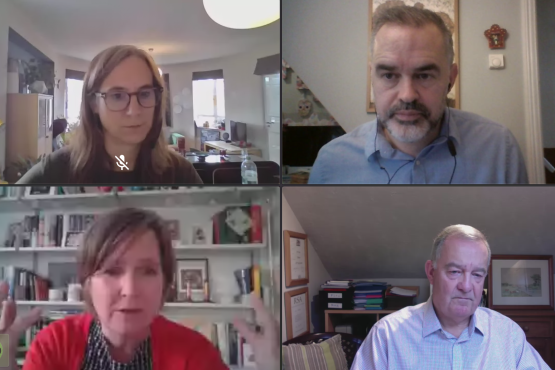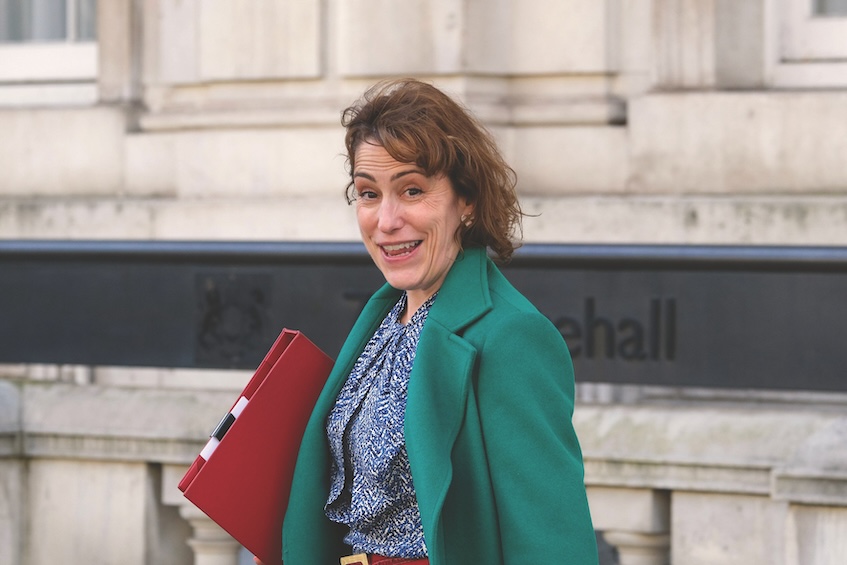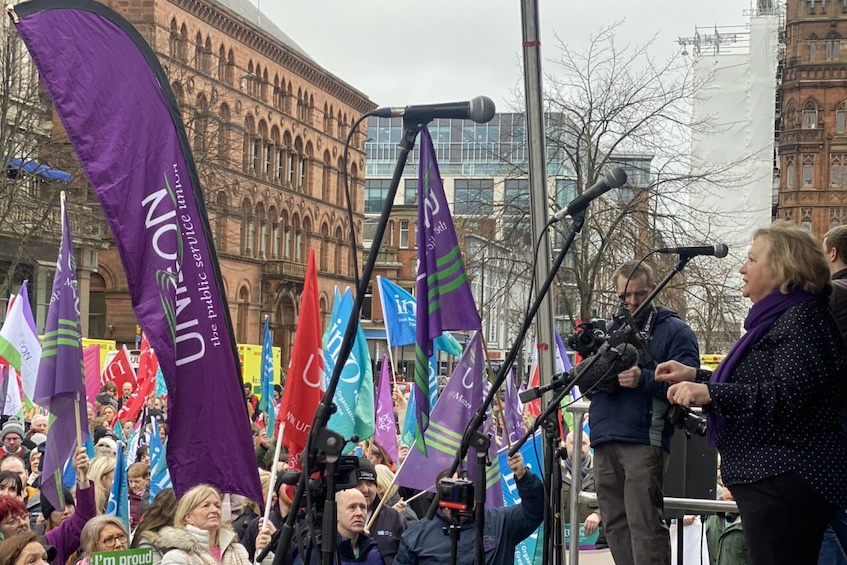MiP Summit: Everyone in the NHS deserves a decent pay rise this year

NHS unions and employers must unite to “advocate for our sector” and make sure all health and care workers receive a “decent pay rise” this year, delegates at MiP’s Summit heard on 5 November.
Thursday’s session of MiP’s virtual Summit featured a conversation on NHS pay between Sara Gorton, UNISON’s head of health, and Saffron Cordery, deputy chief executive of NHS Providers – with contributions from MiP chief executive Jon Restell and National Committee chair David Cain. “We must make sure employers and unions advocate together as a whole sector for our staff,” Gorton told delegates. She said a meaningful pay rise for NHS staff would “boost local economies” while helping to move people off benefits and increasing the Treasury’s tax take.
Cordery agreed, adding: “NHS trusts are anchor institutions in many communities and many families are reliant on an NHS wage. There is a huge economic case for investment in the NHS.”
Cain pointed out that one in 16 people live with or next door to someone who works for the NHS. “The NHS is such a significant economic player. It’s massively important to sustaining family life in the UK,” he said.
Money talks
Cordery told delegates that NHS trusts wanted to reward staff for their “exceptional contribution” during the pandemic, but admitted that the issue was “just under the surface” because of the “extreme operational pressure” trusts are under. “But as soon as we get over this hump, it’s going to be right back up there… Pay is about how we value people and money does talk,” she said.
She also criticised the government’s scrapping of the three-year spending review planned for this autumn in favour of a one-year settlement. “That really limits our options,” she warned.
Gorton said that the NHS faces “a scary few months while we motivate and manage a really exhausted workforce, and a long slog afterwards to recover. So to put ourselves in any sort of position to recover, we have to be looking at a decent pay rise.
“Pay isn’t a silver bullet for workforce issues, but it’s almost like the raising agent you have to put in,” she continued. “Unless it’s in the mix, then none of the other issues work.”
£2k for all?
Calling for a “universal, meaningful and consolidated” pay rise, Gorton outlined UNISON’s campaign for a flat-rate cash increase of £2,000 for all NHS staff. She was optimistic that “the huge public support behind the NHS” would put pressure on the government to respond favourably. “We saw the PM being very grateful for the care he received during his illness. If the government doesn’t follow up… there is real risk of backlash,” she warned. “This isn’t really about an award to individuals it’s about giving people the tools to do the job.”
Welcoming UNISON’s claim as “innovative” and a “good thing”, Cordery called for a pay rise of “nothing less than 3%”. She said: “Clapping is all very well, but what really helps people is a pay award that actually pays their bills.” But securing a multi-year deal was just as important, she insisted: “Organisations need to plan and it’s absolutely critical to know what the pay deal is.”
Gorton and Cordery both rejected the idea of a trade-off between jobs and better pay, and called for the government to fund an agreed pay rise in full. “The pay review body always ask this question and I always say I’m not prepared to answer it,” said Cordery. “It forces a binary response, but it’s not the right question. The right question is, what do we need to do to recruit and reward staff and make sure we have enough staff to do the job?”
Gorton said expected the government to respond by claiming pay rises were a threat to jobs. “But they’re not saying it yet. It’s almost as if they don’t want to admit to the public that they don’t believe people deserve a pay rise,” she explained. “I’m a bit frustrated because I’m really up for this fight: we’ve got the arguments, we’ve got the public behind us and the system is supportive – as Saffron says.”
Managers care about staff pay
Jon Restell said MiP supported a pay deal that would give more help to low-paid staff but was likely to favour a percentage increase with a cash underpinning, rather than a purely cash award.
“Our members think about the people they manage as well as their own pay,” he explained. “Our challenge as a union is how far we balance that. Hardly any trade unions think that way but I’m proud to say we’re one of the few that does.”
Restell warned that many years of neglect had allowed “massive inconsistencies to build up across the pay system”. With past pay deals, “there was always a sting in the tail for Band 8s or 9s”, he said, “and that hurt because people thought they were part of a fair, coherent pay system”.
He stressed that in making the case for a pay rise, it was important to talk about the impact on services. “Our members carry weight as managers,” he said. “If we can talk about how a decent pay rise is going to affect the care that patients receive, we’ll be playing our part as a union.
The discussion was followed by an update from Jon Restell on the current issues with terms and conditions for NHS managers. View the slides from his presentation here.
|
MiP has welcomed moves to speed up pay progression for Band 8 and 9 managers and tackle long-standing problems with the Agenda for Change pay system that deter staff from seeking promotion.
23 September 2024
| By MiP
News
|
|||||
|
MiP has welcomed a 5% pay rise for very senior and executive senior managers in the NHS in England, after the UK government accepted the latest recommendations from the Senior Salaries Review Body (SSRB).
09 September 2024
| By MiP
News
|
|||||
|
MiP has welcomed the 5.5% pay rise for NHS staff on Agenda for Change as “a notable shift” and a “good starting point” for future negotiations.
04 September 2024
| By MiP
News
|
|||||
|
The health secretary’s plans to cut 5,500 management jobs to fund community services if the Conservatives win the general election have been criticised as “not credible” by Labour and “paper thin” by MiP.
25 June 2024
| By MiP
News
|
|||||
|
After months of industrial action, NHS workers in Northern Ireland have accepted a 5% pay offer for last year negotiated by health unions and the Department of Health.
05 April 2024
| By MiP
News
|
|||||
|
NHS leaders must show how they are driving service improvement, delivering transformation, promoting equality and developing a just culture as part of new “competency framework” for directors introduced by NHS England this month.
04 April 2024
| By MiP
News
|
|||||
|
Three-quarters of MiP members say NHS England’s new hybrid working policy is more likely to damage productivity than improve it, according to a recent survey. Half say there isn’t enough office space for staff to return to the office.
03 April 2024
| By MiP
News
|
|||||
|
The latest NHS Staff Survey showed a modest improvement in staff morale, but found NHS workers were facing record levels of discrimination, and a significant proportion still plan to leave their jobs in the near future.
20 March 2024
| By MiP
News
|
|||||
|
Related News
-

MiP responds to the abolition of NHS England
Government risk repeating same mistakes as Lansley by abolishing NHS England and cutting more staff from ICBs, says MiP.
-

NHS England and central staff could be cut by 50%, NHSE has announced
Government planned cuts at NHS England go much further than previously announced, with up to 50% of staff at risk.
-

New MiP survey shows growing support for principle of regulating managers, but warns it won’t improve patient safety
MiP’s member survey on regulating NHS managers shows managers are still not convinced regulation will improve patient safety or raise standards, despite growing support for it in principle.







